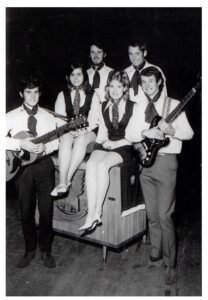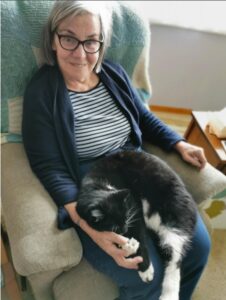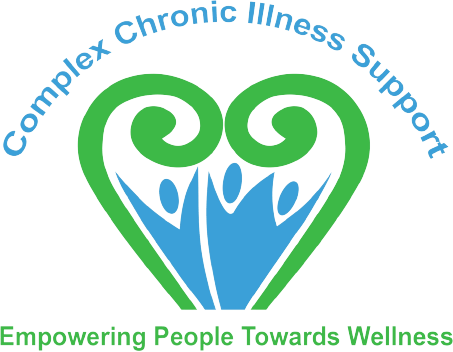Judy Matthew 22-7-1946 to 24-2-2022: Eulogy

It’s my privilege to bring you an overview of Judy’s life.
Judy’s parents were missionaries in China in the late 1930s and in 1941 as the war progressed were captured by the Japanese and spent the rest of the war in Japanese prison camps in Hong Kong and Shanghai. This intense experience cast long shadows on the family down through time which in later life would be a part of the background to a post traumatic stress diagnosis for Judy.
On release from prison camp at the end of the war the family needed recovery time and access to China for missionary work was closing as the communists took control, so Judy’s parents moved back to the Metcalfe family farm at Matakohe on the Kaipara Harbour south of Dargaville.
Judy and her four siblings had what was in many ways an idyllic childhood, watching Dad work the draught horses, playing in the estuary, catching and riding one of the horses bareback to get back to the house, the morepork they called mickey usually on his roost in his tree in the gully by day. At 6 years old Judy cut a tendon in her left little finger on a broken glass and spent weeks in an Auckland hospital so surgeons could graft in a tendon from her foot. It was a lonely 6 weeks for a girl that age. The use of the finger was never fully recovered but she could improvise so as not to affect her later piano and guitar playing.
Judy attended Matakohe school and often used to speak of particular pupils, (one of those, Lockwood Smith, later well known) and teachers including ‘Pa Ness, the ‘purple headed mountain’. Her 3rd and 4th form education was at St Cuthberts College, then she changed schools and completed 5th and 6th forms at Auckland Girls grammar. The latter was as a day girl while boarding with retired missionary friends of her parents with her younger sister, Jennifer. Judy would often reminisce that the two missionaries did not well understand Judy and Jennifer’s need to do school homework nor other social needs of teenagers, focusing instead on ensuring their church attendances. Judy understood how an Auckland education would help her future career but she greatly missed her parents and the freedom of the farm life over these years. In her 5th form at Auckland Girls Grammar she contracted “polio flu” that was circulating at the time, and was sent home to the farm to recuperate. Looking back, this was the starting point of a chronic fatigue syndrome that would remain with her for the rest of her life.
On leaving school she commenced teacher training but after a term decided it was not for her even though working with the children was enjoyable and she had gained fundamental communication skills. She answered an advertisement for an assistant to the perfusionist in Barrett-Boyes open heart surgery team at Green Lane Hospital, training given on the job, and was hired. This led to work as an instrument technician in the operating theatre of Whanganui hospital and in Whanganui she was an active member of the youth group at the Baptist church. The theatre work prompted Judy to do her nursing training she but was not allowed to enroll at Whanganui hospital where she already worked in another capacity so she chose Whangerei hospital, closer to home. Completion of the nursing training took extra time because of the pervasive chronic fatigue and abdominal pains she experienced.

In Whangerei as in Whanganui, Judy was an active member of the Baptist Church youth group. Her photographs and papers from this time show a vibrant personality who loved outdoor recreational activities and interacting with others, whose faith and internal journey was expressed in writing original poems and songs and artistic sketches of outstanding quality.
A lifetime highlight of these years was Judy’s participation in a country gospel band, “The Wayfolk” with 5 other Whangarei Baptist young folk. We are privileged to have four members of the Wayfolk celebrating Judy’s life with us today: Brian & Sally Burgess, Ken Stevenson and Rob Coates. Shortly, Brian will share some Wayfolk anecdotes.
Over 5 years in 1973, 1975, and 1977 Judy completed a three year course at the Bible College of New Zealand and also sat external examinations of Melbourne College of Divinity to gain her Licentiate of Theology. She was a member of the Bible College chorale which undertook singing engagements in churches around Auckland and also sang with Brent Chambers at church functions. The two gap years were for recuperation from the pressures of study with chronic fatigue though during them she gained additional nursing experience as afternoon supervisor at Dargaville hospital.
In Judy’s second year at Bible College in 1975, Cory was a first-year student just returned from 3 years VSA work in Sarawak. As if by divine appointment one Sunday afternoon in March 1975, we were both drawn by a mysterious force to take a walk through the College orchard to the bank of an estuary of the nearby Waitemata harbour where we talked for two hours and found we had much in common. We were married at the end of the College year in November 1976. In 1977 she gained higher marks than me when we both sat the same theology exam. She used to quip to her friends, “I described my ideal husband to God, but I didn’t mention hair, and I didn’t get any.”
After Bible College, Cory and Judy applied to a Missionary Society to work with them in Asia, but the application was declined, Judy’s chronic fatigue condition cited as the reason. A degree in agriculture for Cory was identified as “Plan B”, so we moved to Palmerston North in 1976. Doctors diagnosed Judy’s abdominal pains as ‘endometriosis’ and recommended pregnancy as a treatment. Joanna was born in 1979, Kristy in 1980, and Sarah in 1983. A laparoscopy revealed there was no endometriosis after all so now Judy was challenged with the care of three young children while also dealing with abdominal pain and chronic fatigue. During her pregnancy with Sarah Judy was hospitalized with an acute anxiety syndrome and in those hard weeks a good friend, Chris Staiger, who is with us today, stood by her.
Judy helped the budget by sewing most of her own and the children’s clothes on her Bernina sewing machine but her chronic fatigue mostly prevented her from working as a nurse. Cory pumped petrol at weekends, and kindy-mum and some church friends would appear with groceries at just the needed moment. We got through.
Meanwhile Judy encountered criticism in church from leaders and older women who believed Judy’s chronic fatigue was not real and wanted her to snap out of it, while Cory completed his degree in 1983 and commenced work as a Massey University junior lecturer in 1984.
Judy’s enjoyment of her children and immersion in providing stimulating experiences for them was amazing. Her themed birthday cakes each year for the girls birthdays were legend. She loved to take them to outdoor picnic spots. You will see pictures in the visual tribute.
As the girls grew older Judy was able to resume part time theatre work at Mercy Hospital, then on completion of his PhD Cory had study leave to, Wales and France in 1993. This 9 months overseas was a kaleidoscope of rich experiences for our family. On a doctor’s visit in Wales with one of the children she was kept waiting to see the doctor while others coming in later were being seen. It occurred to Judy the Welsh receptionist might have presumed Judy to be English so she sauntered over to the window and chatted about life in New Zealand. She was seen next! One photo in the visual tribute shows French scientist Gilles Lemaire demonstrating a military “present arms” drill with a moa bone in our lounge in Woodville when he made a return visit to New Zealand and. Judy enjoyed these interactions.
The extent of Judy’s support for Cory’s career is indicated by the fact that she drove the three girls from Dieppe in France onto the channel ferry and, after crossing the channel, from Newhaven back to Aberystwyth in Wales while Cory took the train from Dieppe to Amsterdam to visit Wageningen University; number one in the world in Agriculture. There was an amusing moment back in Aberystwyth from France when Judy pulled out of a carpark in a quiet street in Aberystwyth and drove off down the right hand side of the road. The girls had to remind Judy, “Mummy, we are back in England now, they drive on the left here.” On another occasion driving in England Judy accidentally got into a bus lane and ended up among the buses in the city bus station. Not only was Judy keen to leave there, the bus drivers were keen to help her. On the way back to New Zealand from Wales, after the family had visited the Whitehouse and the Smithsonian Institutions, Judy also brought the girls from Washington Dulles airport to Los Angeles and on to New Zealand while Cory visited Cornell University; number two in the world in agriculture.
On return from Wales, Judy completed a nursing diploma in care of the older adult and worked as a nurse in rest homes in Palmerston North.
Judy was an avid reader, an accomplished knitter, often contributed a song sung solo with guitar to services at church, and frequently an original song she had written for the occasion, and when the chronic fatigue was in remission, she was pianist for the church music group. She tried her hand at oil painting, but the fumes exacerbated her chronic fatigue and she had to stop. Her painting of her childhood farm appears in the photo tribute. I loved and tried to support her diverse creativity.
Around 20 years ago Judy experienced a recovered memory of untoward events in her childhood. She first worked with counsellors to understand and resolve those issues in her past and this sparked an interest in passing on to others what she had learned about herself. She completed her counselling training and supervised counselling work to become a member of New Zealand Association of counsellors with her own practice in rented rooms in Broadway Avenue and outwork at Manchester House in Feilding and elsewhere. During her training one of Judy’s essays on a topic of choice was entitled “Spiritual Abuse” exploring the impact on lives of church members of improper use of influence by church pastors. The lecturer who marked it was challenged by it. One day shopping in Palmerston North, a lady approached Judy, and said, “Thank you, you changed my life.” This affirmation from a client she had counselled a couple of years before, meant a lot to Judy.
In 2012, Judy came home from work one day and said, “I will need to retire, I can’t remember client information in order to dialogue meaningfully with them.” At that point there had been almost no visible indication to the rest of her family. But, gradually Judy began to make mistakes in knitting and sewing and spelling mistakes in emails, and by 2014 her geriatrician had ordered her to stop driving. She read her last book in 2018 and soon after became unable to write. As often happens in Alzheimer’s the loss of brain function was accompanied by behavioural issues and in 2019 there was a hospitalisation to develop drug therapy to assist. There were also happy moments. The Wayfolk 50 – year reunion in November 2019 sparked deep warm memories.
By late 2021 Judy was functionally blind as the brain was now doing little processing of optic nerve data. She frequently needed to ask Cory his name. Chastity took over when cory would offer her a kiss and she would be perplexed as to whether this was permissible, until she remembered I was her husband and that it was OK to kiss your husband. Through all this she kept her trademark smile and enjoyed the company of her cat. I learned to converse in a crazy way with the parts of her brain that were still connecting.
I have omitted whole chapters because time does not permit us to explore them, but I say to Judy now, your life has left us many treasures and you have given me a remarkable 45 years.
Cory Matthew
26th Feb. 2022
